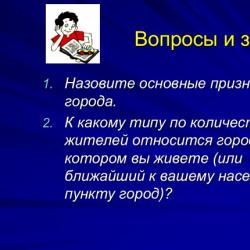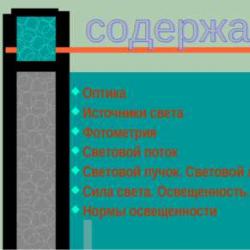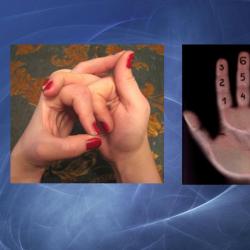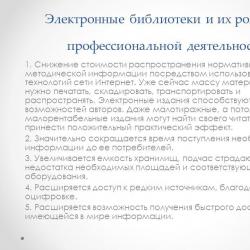Presentation on the topic of electronic library. Electronic Libraries of Russia
Libraries have become one of the most sought-after resources on the Internet. They are called both virtual and electronic, digital libraries. A feature of this kind of library is that a certain part of the information fund (or the entire fund) after digital processing becomes available via networks, CD or DVD. They can be virtual, that is, exist, so to speak, “without walls”, or rely on the resources of already existing traditional libraries. In the latter, as a rule, catalogs are first digitized, and the data necessary for users are sent by e-mail, regular mail or fax. To meet the needs of readers, specially trained personnel work, using modern means of information and communication technologies. The name "electronic libraries" is the most frequently used in Russia.
Electronic libraries and their role for professional activities 1. Reducing the cost of disseminating normative, educational, methodological information through the use of Internet technologies. Already now, a lot of materials do not need to be printed, stored, transported and distributed. Electronic editions contribute to the empowerment of authors. Even small-circulation, and therefore unprofitable publications can find their readers and bring a positive practical effect. 2. Significantly reduces the time of receipt of the necessary information to its consumers. 3. The capacity of storage facilities is increasing, sometimes suffering from a lack of necessary space and appropriate equipment. 4. Access to rare sources is expanding due to their digitization. 5. The possibility of obtaining quick access to all information available in the world is expanding.

Many countries of the world care about the creation of electronic libraries. In the US, they began to form in the 80s of the XX century, in the UK - in the early 90s of the twentieth century. In Japan, the project "Digital Libraries of the 21st Century" is being implemented, and in Germany, the electronic library "Global-Info" is being created. Currently, more than one and a half thousand large and medium-sized libraries in different countries of the world provide access to their electronic catalogs, only in the USA about 96% of public and 85% of university libraries are connected to the Internet. Catalogs of national libraries of 47 countries of the world are presented at:

Electronic Libraries of Russia Only in the Russian-speaking part of the Internet, the number of notable electronic libraries is already several hundred, although not all of them are regularly updated with new materials. State electronic libraries strictly observe copyrights, tend to use electronic copies as an additional source of replenishment of funds, which, however, is natural, since it is necessary to purchase equipment, pay for the work of specialists, create funds, and so on. Private collections sometimes have a significant number of digitized materials in the public domain, however, they are created, most often, in violation of intellectual property rights, without a guarantee that the source matches the original, protection against plagiarism. What materials can a teacher find, for example, for his professional activities in the free access mode in Russian electronic libraries? This largely depends on the status and funding of the library, its links with scientific centers. The largest number of reliable electronic materials and a wide range of services offered among electronic Russian libraries is available in libraries of federal significance.

Russian State Library The largest Russian library is the Russian State Library. On the website of the library - free work with catalogs is possible. The RSL forms the funds of the Open Electronic Library considering this work as a service to the spiritual revival of the nation. At the beginning of 2005, 6602 books, 522 dissertations, textbooks, maps, notes, and illustrations were already in the public domain. The history and culture of Russia, the history and culture of Moscow, school literature, school textbooks, dissertations and dictionaries were named as priorities.

For the fourth year now, the National Library of Russia has been selectively converting publications stored in its collections into electronic form, which marked the beginning of the creation of the electronic library of the National Library of Russia - The digital library includes handwritten and archival documents, unique graphic materials, first printed and hand-colored maps, rare books. The earliest printed materials date from the 11th century. So, for example, in it you can read the first Russian newspaper Vedomosti in years for free. The illustrated catalogs of exhibitions dedicated to cultural values and historical events in Russia are very interesting. Interesting collections of Internet resources on law, medicine, biology, local history. Electronic delivery of printed documents from the RBN funds on user orders (with the exception of archival, handwritten, newspaper materials) works on a paid basis.

State Public Scientific and Technical Library The State Public Scientific and Technical Library is one of the largest federal libraries. An important feature of this library is the development of the Virtual Library project - which helps to find the necessary Internet resources. The database contains over two thousand online magazines and newspapers.

Those familiar with foreign languages can visit the website of the All-Russian State Library for Foreign Literature. M.I. Rudomino - and for history lovers - the State Public Historical Library of Russia -

For biologists, many interesting resources are presented in the electronic library of the Central Scientific Agricultural Library of the Russian Academy of Agricultural Sciences - The distributed catalog makes it possible to work with descriptions of books, journals and publications of the BEN RAS, catalogs of the RSL, State Public Scientific and Technical Library and the Library of Moscow State University, the Agros database of the Central Agricultural Library of the Russian Agricultural Academy and other sources . The section "Electronic dictionaries, reference books" presents such resources as: "Agriculture: a large encyclopedic dictionary", "Encyclopedia of the nature of Russia", "Veterinary encyclopedic dictionary", "Encyclopedia of seeds", "Biographical encyclopedia of the Russian Academy of Agricultural Sciences, VASKhNIL" and others. Also there you can clarify the Latin names of plants and find out the meaning of scientific terms used in genetics and breeding of farm animals. The largest agricultural library in the world offers paid services for the delivery to a remote user of a copy of literature sources from the collections of the Central Agricultural Library on electronic media.

Unfortunately, national and republican libraries, not to mention city and other libraries of local importance, are much less able to provide modern services using the Web. At best, this is work in catalogs and the possibility of ordering copies, and most often library sites are advertisements. Almost all of them are at the stage of creating an electronic catalog, not providing free access to electronic publications, but even this is a great help for teachers, since now it is possible to work with the catalog using the Internet in a convenient place and at a convenient time, and then apply for the necessary publications directly to the local library. The most functional is the site of the National Library of the Republic of Tatarstan - in which, since 2002, work has been carried out to create a fund of electronic publications in order to provide readers with access to the most valuable and unique publications. The result of this activity was the electronic collection "Thousand Year Kazan".

The most complete available e-mail addresses of Russian libraries are presented on the official portal of the Department of Libraries of the Federal Agency for Culture and Cinematography of the Russian Federation - Here are links to the sites of federal, national and republican, central universal libraries of the constituent entities of the Russian Federation, branch and special libraries; libraries of museums, public authorities and trade unions and others.

Libraries of higher educational institutions contain great potential opportunities. The world's leading universities give users the opportunity to work with the catalog in their electronic libraries and a variety of scientific publications in the free access mode. Access to the funds of Russian universities is most often carried out on a paid basis, but, as a rule, you can work with good catalogs for several branches of science for free. An example is the catalog of the fundamental library of St. Petersburg State Polytechnic University. The Moscow State University Library is not easily accessible to external users, as it has entered into a license agreement with the Scientific Electronic Library to connect the computers of its university local network to the resources provided by the electronic library, so only libraries of some faculties are available for free use on the Web.

Moshkov's Library Of the private collections, the most significant is the free library of Maxim Moshkov - numbering several thousand digitized texts. Sections: fiction, science fiction and politics, technical documentation and humor, history and poetry, Russian rock, tourism and skydiving, philosophy, etc. Many (for example, publishers) are trying to close it because of copyright infringement. In turn, M. Moshkov believes that the existing copyright law threatens the existence of free electronic libraries, and even news sites and Internet publications. What can be found in the Moshkov Library? For example, the Russian Classics section contains links to full-text works by more than 200 authors, from classical texts by Pushkin, Turgenev and Tolstoy to little-known ones, such as Dmitry Oznobishin, Alexander Shakhovsky, and others. The poetry section with almost 250 names of Russians and foreign poets.

Aldebaran Library Another large-scale library - "Aldebaran Library" - contains books of various genres: science fiction, detective stories, adventure and children's literature, old books. At the time of writing these lines, the works of 6091 authors can be found on Aldebaran. The structure of this library is somewhat different. First, there is a category by genre. Secondly, in parallel with this principle, rubrication is implemented based on character access - by authors' names. In addition, the bottom line contains a list of recent additions to the library (New books), a list of books, electronic versions of which have been updated, corrected, supplemented (Updated books). There are also readers' reviews about what they read: there is a commenting form under each posted text (Reviews), feedback forms (Guest and Forum). All this makes the library interesting and easy to use.

It is not worth continuing the description of existing libraries: they are structured almost identically and differ only in the list of authors (and even then not always) and the volume of materials. What can be found in them besides texts? For example, the non-commercial electronic library Im Werden contains a lot of interesting materials, some of which are unique. On the left side of the site page we see a rubricator, where among the posted texts (Old Russian literature, Russian literature of the 18th century, 19th century, 20th century, modern literature) you can find rare materials. In the heading "Author Reads", for example, there are 104 musical fragments with recordings of the author's reading. If the voices of Akhmatova, Chukovsky, Brodsky, Okudzhava, Gorodnitsky, Bitov can still be heard today from different sources, then the voices of Zoshchenko (the only surviving recording), Andreev, Bryusov, Bunin, Voloshin, Gumilyov, Yesenin, Mandelstam, Mayakovsky are rare recordings . Of no less interest is the "Documentary Video" section, where you can find videos with Brodsky, Akhmatova, Yesenin, Zabolotsky, Pasternak, Tarkovsky. In the same library, one can find works on linguistics, philosophy, psychology, pedagogy, books of the Academia publishing house issued in the 30s of the XX century.

With all the richness of the sources presented in various online libraries, the real problem is the accuracy and reliability of the texts placed in electronic libraries. It so happened that in the early stages of the development of the Internet (and even now in many respects) digital libraries were collected by enthusiasts, people who did not have professional skills in the bibliographic or philological fields. Consequently, the issues of reliability, authenticity of the presented text turned out to be secondary in many respects. Therefore, you can meet incorrect formatting, typos, text fragments presented as whole texts. Unfortunately, from a scientific, academic point of view, most modern digital libraries are not reliable enough sources.

Speaking of electronic libraries, one cannot but pay attention to two specialized search engines. Project "Biblus" is a bibliographic catalogue. As it is written on the site, “Biblus is all the books of Russia. A bibliographic catalog that includes 1.1 million books, about 300 thousand authors and the most detailed (125 thousand headings) UDC rubricator, clearly structuring and describing almost all areas of human knowledge and books on them. Thus, this is not an electronic library in the usual sense, but a huge and convenient catalog of "paper" books designed for bibliographic search. There is also a search engine designed to search for works placed in electronic libraries. The site is an attempt to create a specialized search engine in the field of e-books, which has indexed more than units today. In addition to the basic search, the interesting features of the service are the following: · the ability to search for books within a particular library; the ability to search for books in several libraries; Possibility to subscribe users to updates of specific books in the electronic library; The ability to search for both individual words and exact phrases.

Federal Libraries - Russian State Library (RSL) - Russian National Library - State Scientific Pedagogical Library. K.D. Ushinsky Russian Academy of Education (GNB RAO) - All-Russian State Library for Foreign Literature named after V.I. M.I. Rudomino - State Public Historical Library of Russia (GPIB) - State Public Scientific and Technical Library (SPNTB) - Central Scientific Agricultural Library (TSSHB)

National and Republican Libraries of the Russian Federation - National Library. A.-Z.Validi of the Republic of Bashkortostan (Republic of Bashkortostan, Ufa) - National Library of the Republic of Karelia (Republic of Karelia, Petrozavodsk) - National Library of the Komi Republic (Republic of Komi, Syktyvkar) - National Library of the Republic of Tatarstan (Republic of Tatarstan, Kazan) - National Library Republic of Chuvashia (Chuvash Republic, Cheboksary)

Foreign Libraries - The Library of Congress (Library of Congress) - The British Library (British Library) - Biblioteca Nacional de Espana (National Library of Spain) Bibliotheque nationale de France - (National Library of France)

The provision of materials in electronic form means that, with the appropriate hardware and software, users can access the materials regardless of location. There is no longer a need to personally go to the library where materials are stored, as was the case with printed publications. Thus, there is an excellent opportunity to expand access to funds, while avoiding the rapid deterioration of materials. Creating a scenario for providing access to large amounts of resources through the network requires significant financial and human resources. There is no doubt that digital libraries will develop and improve. Gradually, from copying printed publications and creating funds of digitized materials, libraries will move on to more complex work, they will begin to perform not only consulting, but also educational functions. Moreover, in the future, electronic libraries will turn into "public centers of the information society." The creation of large and accessible national electronic libraries contributes to a more efficient use of information, which in the future will have a positive impact on the level of development of science and technology, culture and will improve the education system. Electronic libraries that provide the opportunity to work with modern electronic educational resources in free access mode will help improve the efficiency and quality of professional activities.

References 1. Anokhin S.Yu. Digital Libraries // Journal "People's Education" 2 (1355), S. Bochenkov V. No need to live in everyday consciousness, or How to strengthen the position of "Russia reading"? // Teacher's newspaper The future of digital libraries in the consolidation of the scientific, educational and cultural community Garbo O. Information services, libraries, archives // UNESCO World Report on Communication and Information in the years. Head Methodological and Literary Internet Server Russian Scientific Electronic Journal "Electronic Libraries" // Volume 3. - Issue Tonneev F. Waiting for the Creator. Love the e-book - a source of knowledge // Teacher's newspaper Fred Guy. Development of digital libraries: the experience of some national libraries in North America, Australia, Asia and Europe // Russian Scientific Electronic Journal. - Issue Shrayberg Ya. L. Libraries and information technologies: ten years later. Annual Plenary Report of the International Conference. - Crimea, 2003

"Knowledge is such a precious thing that it is not shameful to obtain it from any source." Thomas Aquinas (ok)


A) according to the degree of accessibility: - freely available - imply completely open access to documents; - conditionally available - representing in the public domain a fragment of the document and a way to order the full text; - commercially available - providing resources on the basis of a reimbursable contract only based on the results of authorization and in the presence of clearly defined financial relationships.


C) by types of publications: - mono-documentary - contain documents of only one format (for example, only audio books, text documents, multimedia textbooks, etc.); - polydocumentary - contain documents of different formats (text documents, audio books, videos, etc.).

D) by the method of creation: - generated - collections that are created by the holder of documents; - consolidated - are created from existing documents and collections; - mixed - are organized from generated (created by the holder) and aggregated (collected from different sources) documents.



Library of Old Russian Literature (

Gaudeamus (Military Literature (


Electronic library of Maxim Moshkov (

Electronic library of fiction (Non-commercial electronic library "ImWerden" Non-commercial electronic library "ImWerden" (


An electronic library is an ordered collection of heterogeneous electronic documents equipped with navigation and search tools. It can be a website where various texts (more often literary, but also any other, up to computer programs) and media files are gradually accumulated, each of which is self-sufficient and can be requested by the reader at any time.





Fundamental Electronic Library (FEB) "Russian Literature and Folklore" (

University Information System "Russia" (Electronic Library IQLib (

Google Digital Library (Google Book Search -



Educational project of Runet (Digital Libraries of Russia (

slide 2
Definition
Electronic_library is an information system that allows you to reliably store and effectively use a variety of collections of electronic documents (text, visual, sound, video, etc.) localized in the system itself, as well as available to it through telecommunication networks.
slide 3
Reasons for the appearance of digital libraries
First, the number of publications in the press is growing very rapidly. Libraries simply do not have time to process information. The way out is to present periodicals in electronic form in full text with standard search engines.
Secondly, the storage space for funds is limited. The creation and use of electronic versions is one of the real ways to solve this problem.
Thirdly, it is necessary to ensure the safety of library collections. To do this, libraries need to create themselves or collect, along with printed publications, their counterparts on other media, including electronic ones.
Also, libraries should promptly serve users, making it possible for them to quickly search for the required information. Today, users have a choice: use modern search tools and, from the comfort of their home or office, view the full text of a document on the Web or go through all the circles of traditional library service.
slide 4
Tasks of digital libraries
providing wider access to documents, the provision of which to readers is difficult or limited (rare books, photo albums, handwritten books, dissertations, etc.)
organization of funds of documents / data that exist exclusively in electronic form, their cataloging and providing access to them to consumers of information
providing users with qualitatively new opportunities for working with large volumes of electronic data
slide 5
Benefits of Digital Libraries
The user receives information regardless of time and location - his own or the library.
The efficiency of providing users with the necessary literature, documents and data is significantly increased.
The user has the ability to access heterogeneous electronic resources.
The implementation of new forms of library and information services for users is facilitated.
Documents that are available in libraries in a limited number become available to a much larger number of users.
Working with digital electronic documents can go far beyond simply reading text or viewing an image. Fragments of the original data can be used in the work, combining, adding and editing materials.
It is possible to quickly and qualitatively search for certain fragments of a document, its semantic analysis and other types of software processing.
Achieved savings in space and space compared to a conventional library.
slide 6
Classification of digital libraries
- A separate electronic library is an ordinary classical library, and at the same time it is fully automated.
- An integrated electronic library is a group of several independent libraries united by a common theme and communication network.
- Collective electronic library - a virtual library that provides uniform access to resources scattered over the network and thematic materials.
Slide 7
Types of digital libraries
Slide 8
Examples of digital libraries
Catalog of electronic texts on Russian and foreign literature, culture, philosophy, history and other humanitarian disciplines.
On the site you can download books of all genres and authors who lived at different times for free.
Over 100 genres of e-books. You can download books not only in fb2 format, but also in txt and rtf formats. You can find any fb2 books using the site search. You can read any books directly on the site without downloading them.
Domestic and foreign prose and poetry, literature on philosophy, medicine, psychology, etc.
You can download books, reference books, magazines and dictionaries for free.
View all slides
General Information Since January 2009, the staff began work on the creation of an electronic library. The purpose of creating an electronic library: to ensure the effective use of information resources and technologies in the educational, research areas.

General information When selecting software, library programs were studied - IRBIS, MARK, Unilib, Bibliographer-2007, UFD-Library. To solve the problems facing the library, a more flexible and promising program UFD-Library was chosen.

Electronic library: main components Electronic catalog Database of full-text publications Information retrieval system System of access to full-text publications

Electronic catalog The electronic catalog is available from computers located in the reading room of the library, as well as via the Internet.

Electronic catalog At the moment the catalog is exposed as a web version on the Internet to provide remote access to it.

Electronic library status as of Number of descriptions in the electronic catalog 12319 Number of descriptions of articles from periodicals in the electronic catalog 2577 Number of descriptions of the works of LGIKI employees 399 Electronic full-text documents (total) 3410 Number of articles from periodicals in electronic form 586 Electronic documents - works of LGIKI employees 35 Number of audio- and video materials in the electronic catalog 277

Electronic Library Currently, work is being carried out in the following areas: creation of a collection of music (full-text), audio and video materials; reflection in traditional catalogs of documents that do not have printed counterparts; analytical painting and digitization of articles from periodicals.

Electronic library: search system Search by title, author, Search by classifiers: keywords, personalities, LBC Search ISBN, ISSN Search by annotation


Search result In addition to the search results, the page displays the search terms, the total number of documents found, and the search range. If you need more detailed information about the document, select the "Document Description" link.

Search result In the next window, a full description opens in place with an annotation of the document

If you need an electronic version of the document, just click on the "Get" button and select "Open" in the dialog box.

Search for articles and journals Registration of periodicals consists in compiling bibliographic descriptions of articles with their binding to the corresponding document: issues of a journal, newspaper, etc. The journal number is the main document. Linking an article in a journal issue facilitates the ordering process: after finding an article, the reader easily jumps to the journal issue that can be ordered. In addition, if a bibliographic description is created for each issue of a journal, then all articles of this journal will refer to this description - therefore, it is easy to select all articles of this journal.



Modern information and bibliographic technologies make books more accessible. Providing information becomes possible in any part of the world - just visit the library's website. Our website: lib.lgiki.com.ua







